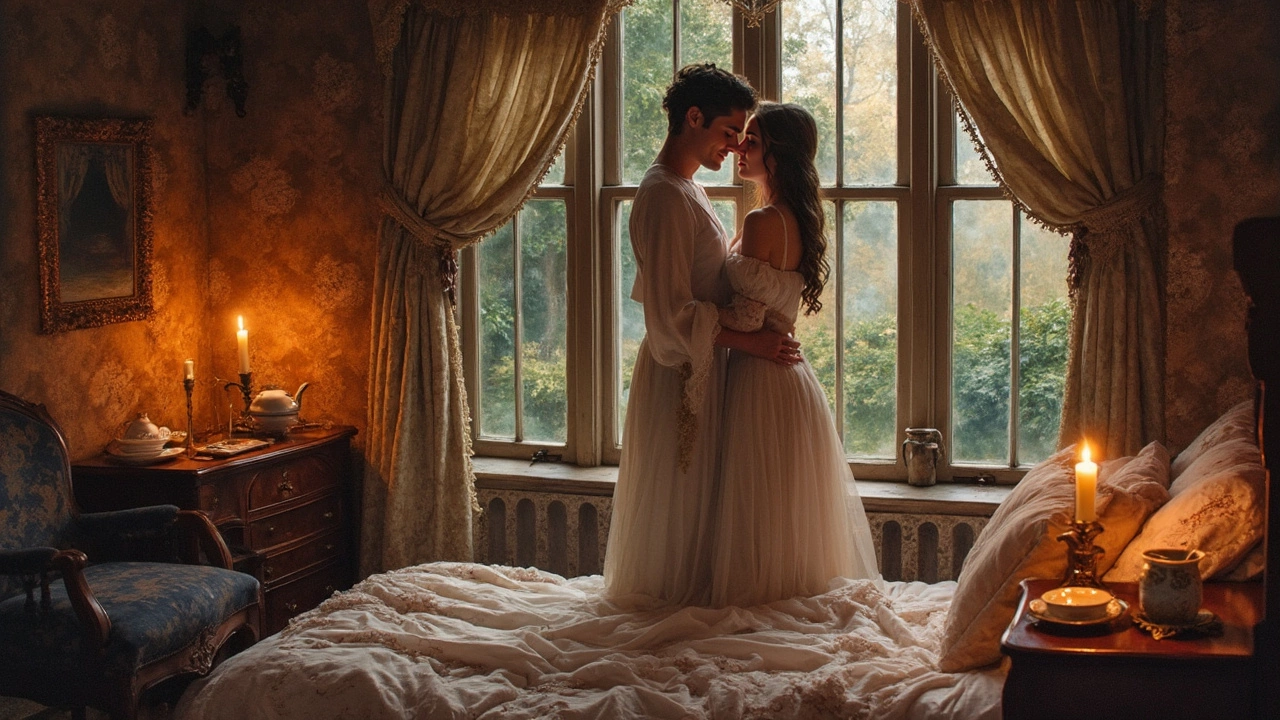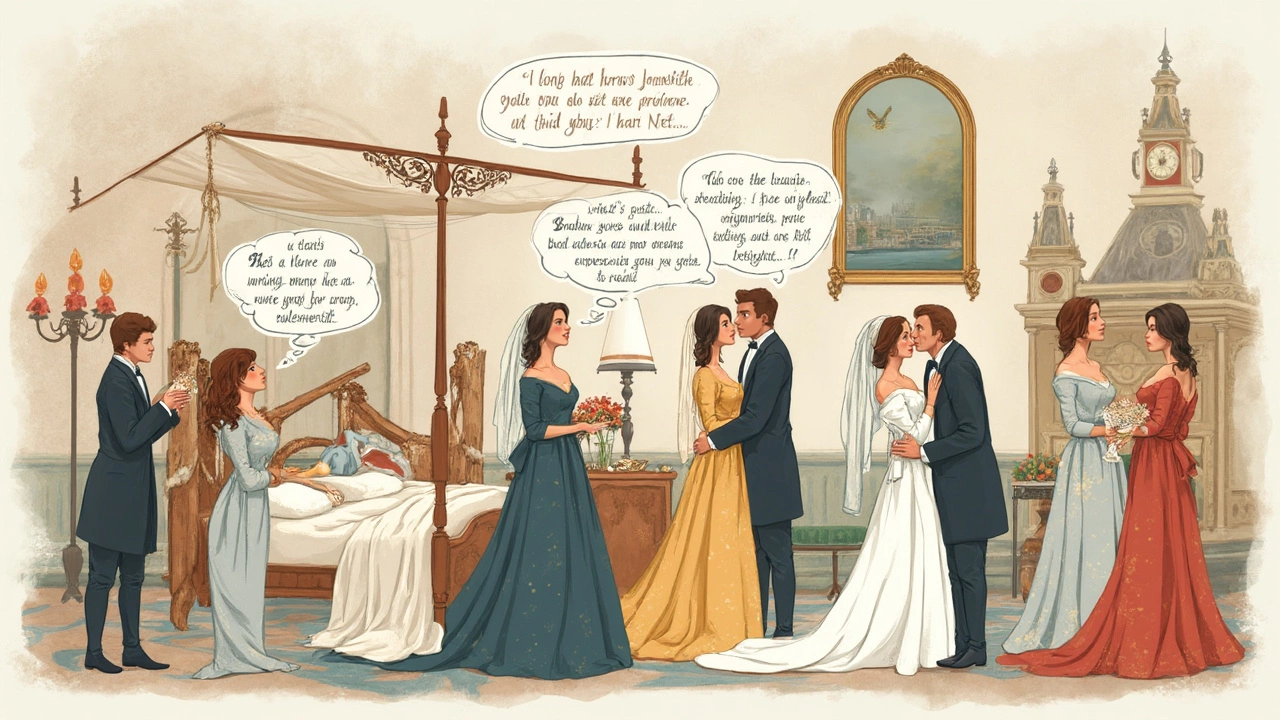Bedding in Marriage: Meaning, Traditions, and Modern Realities
 Jun, 24 2025
Jun, 24 2025
Imagine standing in a packed room, everyone waiting for you and your bride—or groom—to go off to bed. Everyone’s staring, some are smirking, and you can feel a strange pressure brewing in the air. Sounds awkward, right? That’s precisely what centuries of couples experienced during the old ritual called bedding. For a lot of people today, this concept triggers some strong reactions: disbelief, confusion, or maybe a bit of embarrassment. But it’s a big part of marriage history, and it still pops up in some places more than you might think.
What Does Bedding in Marriage Mean?
The idea of bedding in marriage goes back hundreds, if not thousands, of years. At its core, 'bedding' just means the first night spent together by a newly married couple—often with lots of witnesses and tradition attached. Back in medieval Europe, marriage wasn’t seen as truly official until the couple consummated it, which means—yep, having sex for the first time as husband and wife. But people weren’t exactly private about it. Families, friends, even priests sometimes, would escort the couple to their bedroom with songs, jokes, and even a little nudging. The whole thing could feel more like a stage play than a romantic moment. The big scene? The newlyweds go to bed, and sometimes the guests would stick around just to make sure things really happened. This wasn’t just for show: inheritances, family honor, and property deals could hinge on proof that the marriage was ‘real.’
Bedding rituals popped up all over. In Scotland, the 'bedding of the bride' was part of some clan’s wedding package. In Elizabethan England, bedding ceremonies could get rowdy, and good luck sleeping with everyone clinking glasses in your face. Even now, some Jewish and Romani communities keep traditions alive in their own way, focused less on proof and more on celebration. In contrast, places like Denmark saw the bedding ritual as a mark of respect—the key moment when private life really began. And yes, sometimes there was a 'proof of blood' requirement for the bride, adding an extra layer of pressure, which sounds downright harsh today.
A fun fact? There’s evidence from the 17th and 18th centuries that some families would hang out until the pair were tucked under the covers, then bring them soup or wine to get the romance going. Imagine your in-laws pouring you a drink as you’re trying to kick off your first married night. If that’s not pressure, what is?

The Evolution of Bedding Night Traditions
Modern couples might wonder why on earth anyone would want guests—let alone a whole crowd—involved in their wedding night. Traditions change, cultures evolve, and privacy has become a precious commodity. But for a long time, bedding was serious business. It protected family interests and even national alliances. In some European royal courts, it was documented who watched, who heard, and who signed off on the deed. At the French court, bedding was a public affair, sealed with signatures from witnesses. In Russia, parts of Serbia, and Greece, the wedding beds were sometimes decorated with flowers and coins as a wish for luck, wealth, and fertility.
By the 19th century, bedding ceremonies started to fade in most Western cultures. Couples craved privacy, sensibilities changed, and religion began to play a slightly less controlling role in the bedroom. But the echoes of those customs still pop up. The whole concept of the 'wedding night' itself, full of expectation and symbolism, comes straight out of these ancient rituals. Even bachelor and bachelorette parties can be seen as modern replacements for those old group send-offs—I mean, it’s all about celebrating or teasing the new couple, just less awkward and much more private.
One study published in 2023 by the British Museum noted that 75% of surveyed British adults under age 35 hadn’t even heard of the bedding ceremony, while 18% of people over 65 remembered parents or grandparents talking about it. That’s a rapid cultural shift. In Scandinavia and parts of Eastern Europe, older folks still have vivid memories of the wedding night being a family topic, if not an outright event. In New Zealand—where I live—you’re far more likely to see a couple kissed goodnight with a speech and then left to their own devices.
Traditional bedding customs can be sweet or cringey, depending on your point of view. In many Asian cultures, family or friends might gently tease the couple or even decorate their room with candy, coins, or humorous notes, wishing them a fruitful union. Some still believe that whoever makes the bed will dominate the marriage—that’s a high-stakes pillow arrangement! With so much global variety, it’s wild how different cultures can be about someone’s most private moments.
| Location | Traditional Bedding Practice | Still Observed? |
|---|---|---|
| Scotland | Bridal bedding procession with family and guests | Rare |
| Greece | Decorating wedding bed with coins for luck | Sometimes |
| Jewish Ashkenazi communities | Yichud - couple left alone for several minutes post-ceremony | Common |
| China | Friends placing nuts and dates (symbols of fertility) in the wedding bed | Yes |
| England (historical) | Public procession to the bedroom | No |

Navigating Modern Expectations and Realities
It’s easy to scoff at the old traditions, but the truth is, a new kind of pressure exists around bedding in marriage even today. Movies and social media have cranked up the expectation that the first night as a married couple should be fireworks, roses, and wild passion. But the reality? Sometimes people are exhausted, stressed, or just ready to watch some Netflix and crash. One survey from 2022 found that 52% of newlyweds in Australia admitted they didn’t have sex on their wedding night—they were either too tired or had had a little too much champagne. So you’re not alone if your wedding night wasn't the steamy scene you imagined.
So how do you handle all the expectation? For one, talk openly with your partner before the wedding. If you both know it could be a huge day with family, travel, or nerves, give each other a pass and agree that your first night is about whatever feels good for you—no rules set by centuries-old traditions. Some couples actually choose to skip the bedroom altogether that first night, instead opting for a walk, a late-night snack, or even a multiplayer video game session. Why not? You’re married; you set the rules.
But what if you’re curious about spicing up your wedding night? Here are a few tips that people actually find useful (no awkward rituals required):
- Communicate your expectations—surprises are fun, but being on the same page helps avoid disappointment.
- Pack a comfortable outfit in advance—sometimes those fancy wedding clothes are torture after a long day.
- Set your room up with snacks and water—the last thing you want is to be hungry or parched after hours of celebration.
- Don’t feel pressured to meet anyone’s expectations but your own—the world’s changed, and what you do is your own business.
- A little humor goes a long way—most wedding-night stories you’ll laugh about years later, anyway.
For some couples, bedding isn’t really about sex at all. It’s about marking a new beginning, sharing a private moment, or just crashing out together after the wildest party you’ve ever thrown. So if you’re wondering why the term comes up during wedding planning, remember it’s just a historical leftover. You’re free to make new traditions—or ignore the old ones entirely.
Marriage is personal. Bedding’s meaning has shifted from a public spectacle to a private celebration, with every couple rewriting the script. Whether you dress the bed with coins, invite a crowd, or lock the door on everybody, it’s that sense of stepping into a new life together that matters most. Auckland, London, Beijing, or New York—those first few hours as a married pair are yours and yours alone. That’s one marriage custom most of us can finally agree on.